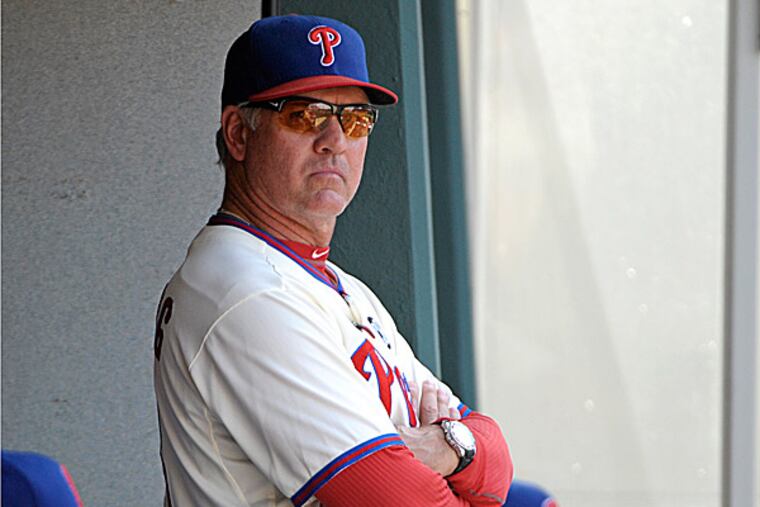Phils: Lots of scapegoats but no plan
The teams professed sense of loyalty seems to apply to Ruben Amaro, and no one else.

THE FIRST MAN to exit did so on a late July night. One could argue he was the same batting coach who helped give the Phillies the most successful offensive period they'd ever had: the most runs in the National League in 2006 and 2007. A World Series title in 2008. But on July 22, 2010, after an offseason in which they traded for Roy Halladay and traded away Cliff Lee and signed Danys Baez to a 2-year deal, the Phillies were a mere three games over .500 while averaging 4.6 runs per game. And so they fired Milt Thompson.
The second man to exit did so on an early October afternoon. One could argue he was the same man the Phillies tapped to replace Thompson, one who oversaw an offense that averaged 5.0 runs per game over the final 67 games of 2010, and who coached for a team that went 150-79 in the first year-and-a-half after his installation. But on Oct. 3, 2012, after a 2-year stretch in which they opted against re-signing Jayson Werth, and watched Chase Utley and Ryan Howard succumb to injuries, and traded the farm for Hunter Pence and then traded Pence for less than that, and attempted to replace them all with the likes of Ben Francisco and John Mayberry Jr. and Juan Pierre and Laynce Nix and Michael Martinez and Freddy Galvis, and paid $1.25 million for 71 Jim Thome plate appearances, the Phillies were 81-81 and out of the playoffs for the first time since 2006. And so they fired Greg Gross.
The third man to exit did so on a mid-August morning. One could argue he was the same man who managed the Phillies to their best 5-year stretch in franchise history, to their second World Series title, to four of their 11 National League Championship Series berths. But on Aug. 15, 2013, after a 2-year stretch in which they added $19 million per year at the back end of their bullpen and $1.25 million to their rotation and roughly $11 million to their lineup, the Phillies were 53-67 and had allowed the most runs in the National League while scoring the fourth fewest. And so they fired Charlie Manuel.
The fourth man to exit was the pitching coach, the fifth man the scouting director, both of them present throughout the most successful period the Phillies had ever had.
"I just believe that group of people gave us the successful period we had," club president David Montgomery told the Inquirer in July. "It's not like we're not benefiting from the thinking of the same people we had before. That's why you have to look at the whole body of work."
He apparently was not speaking about Milt Thompson, or Greg Gross, or Charlie Manuel, or Rich Dubee, or, time would tell, Marti Wolever, who on Friday was relieved of his duties as director of amateur scouting after 22 years in the department. Or, for that matter, Pat Burrell, or Geoff Jenkins, both of whom helped deliver the Phillies' clinching win in Game 5 of the 2008 World Series, and both of whom were gone by the following Opening Day. He was speaking of his front office - in particular, general manager Ruben Amaro Jr.
One by one, the Phillies have parted ways with many of the people who helped give them the most successful period they had ever had. Through it all, the decline has continued. They have scored fewer runs while allowing more. They have fallen out of playoff contention earlier and earlier. One by one, the variables have been eliminated, with little discernible impact on the end result.
Blind loyalty is a charge that has followed this organization for much of the past 2 decades, but the attrition that we have witnessed suggests that there is nothing blind about it. In the end, it comes down to this: A leader's ultimate loyalty lies either with his mission or with the people he has tapped to execute that mission.
Yesterday, a third straight lackluster season arrived at its conclusion. Yesterday, the Phillies failed to improve upon their win total for a third consecutive year.
And as another October begins without them, the real question that must be answered is this: What is their mission? What is their plan?